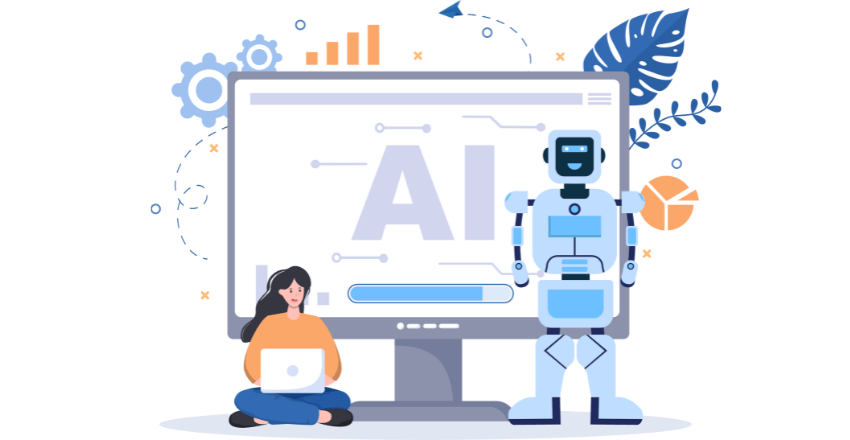AI helps businesses in high-turnover industries hire faster and smarter. It screens résumés, automates scheduling, and predicts top candidates. This reduces hiring costs and improves employee retention.
Why AI Is Essential for High-Churn Hiring
Industries with high employee turnover such as retail, hospitality, and healthcare face constant hiring challenges. Workers often leave for better opportunities, burnout, or seasonal employment shifts. This forces businesses to repeatedly search for new employees, slowing down operations and increasing hiring costs.
Traditional hiring methods can’t keep up. Sorting through hundreds of applications, scheduling interviews, and onboarding new hires take too much time. AI-powered recruitment tools solve these problems by automating repetitive tasks, filtering candidates efficiently, and predicting which hires are most likely to stay. This speeds up hiring and improves employee retention.
Common Hiring Challenges in High-Turnover Industries
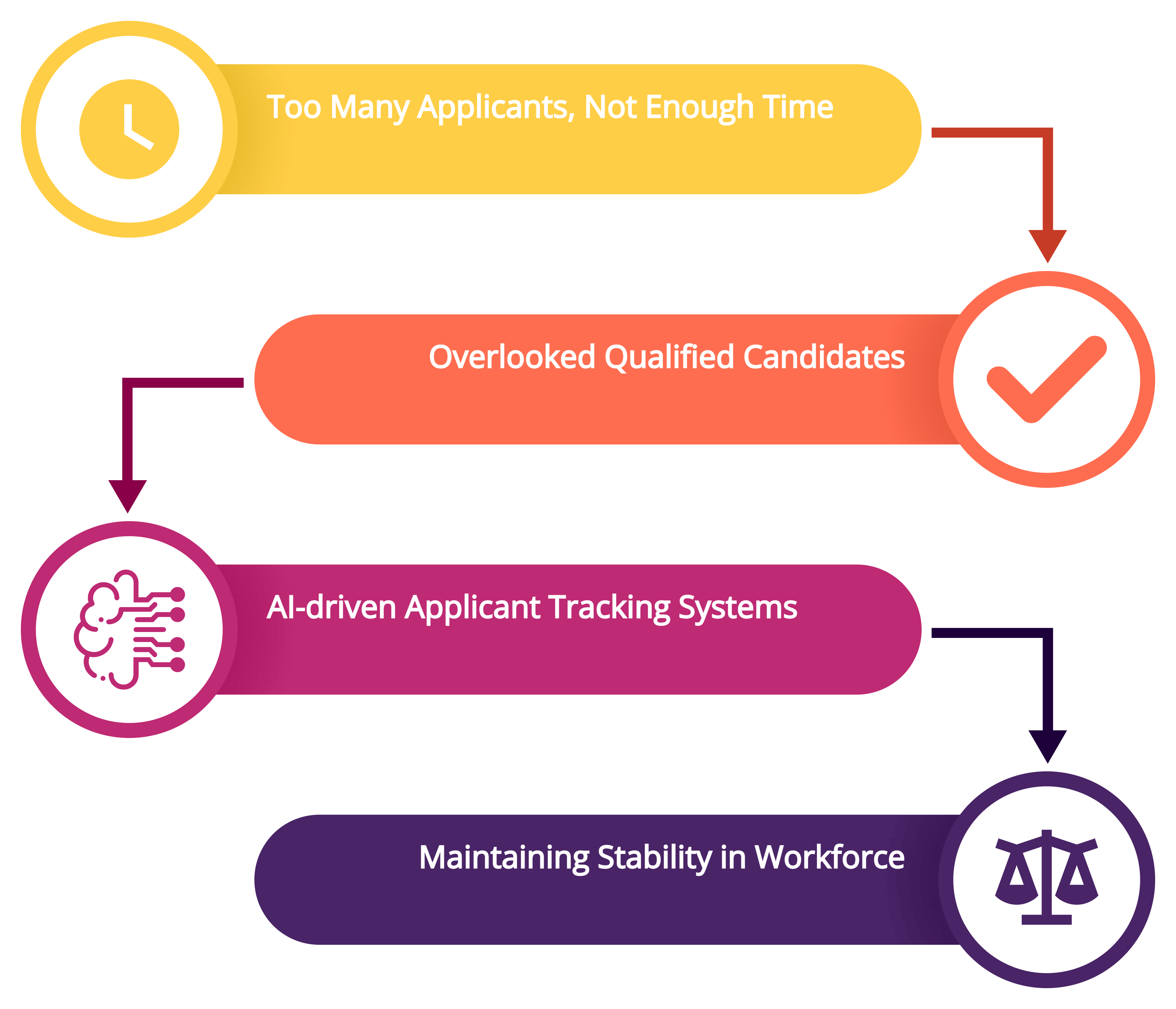
Businesses with frequent employee turnover struggle to maintain stability.
1. Too Many Applicants, Not Enough Time
Entry-level jobs in high-turnover industries attract a large number of applicants. A single retail or hospitality job posting can receive hundreds of résumés. Manually reviewing each one takes time, and overwhelmed hiring managers may overlook qualified candidates.
How AI Helps:
- AI-driven applicant tracking systems (ATS) automatically scan and rank résumés based on job requirements.
- Machine learning algorithms highlight candidates with the best skills and experience.
2. Slow Hiring Process Loses Good Candidates
Speed matters in high-turnover industries. The best candidates apply to multiple jobs at once and often accept the first offer they receive. If a company takes too long to review applications or schedule interviews, they lose top talent to competitors.
How AI Helps:
- AI chatbots instantly respond to job seekers, answer FAQs, and schedule interviews.
- Automated workflows speed up background checks and reference verifications.
3. High Training Costs Drain Resources
Frequent hiring means constant training, which takes time and money. New employees require onboarding, skills development, and company orientation. If employees leave shortly after being hired, businesses waste resources training people who don’t stay.
How AI Helps:
- AI-powered onboarding platforms personalize training based on each employee’s role.
- Automated training tools ensure consistency, reducing the need for repeated manual instruction.
4. Bad Hires Lead to Constant Rehiring
Hiring mistakes are costly. A bad hire may leave within weeks or months, forcing businesses to restart the hiring process. This cycle affects productivity and morale.
How AI Helps:
- Predictive analytics assess candidate history and behavior to identify those most likely to succeed.
- AI-powered assessments measure personality, work ethic, and cultural fit before hiring decisions are made.
AI makes hiring faster, smarter, and more efficient in high-turnover industries. By automating résumé screening, scheduling, onboarding, and predictive analysis, businesses can reduce hiring costs, improve employee retention, and build stronger teams.
How AI Transforms Hiring
AI is changing the way businesses hire by automating screening, scheduling, and decision-making. Recruiters no longer have to spend hours sorting through résumés or manually scheduling interviews. AI-powered tools handle these repetitive tasks, allowing recruiters to focus on selecting the best candidates. This speeds up the hiring process, reduces costs, and improves employee retention especially in industries with high turnover.
1. AI-Powered Resume Screening
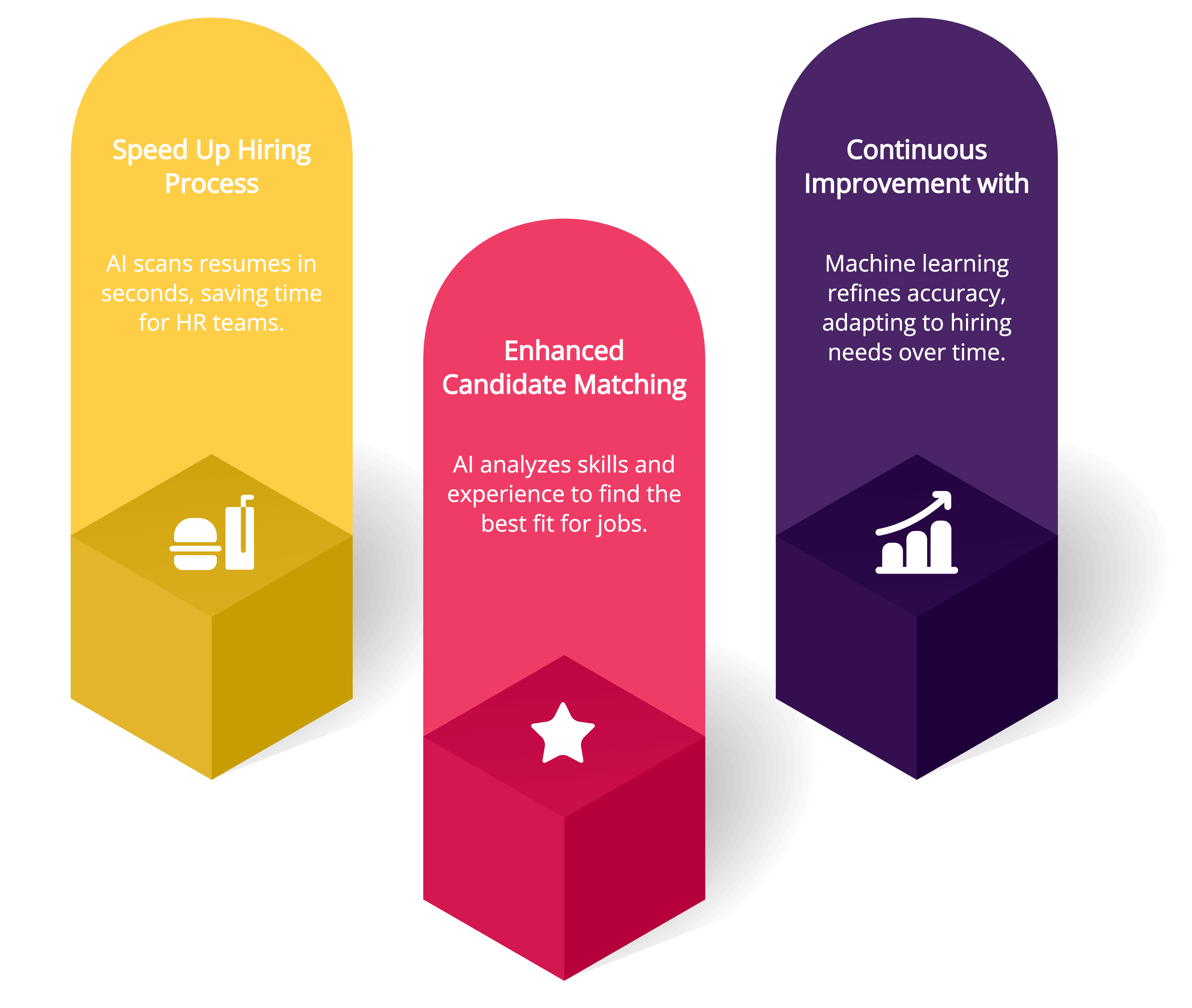
Sorting through hundreds of job applications is time-consuming. AI-powered screening tools scan résumés in seconds, identifying candidates who meet the job’s requirements. These tools analyze skills, experience, and job fit based on pre-set criteria. Some even use machine learning to improve accuracy over time.
Examples:
- Kaynes – Uses AI-driven algorithms to screen résumés and rank applicants based on qualifications.
- Pymetrics – Assesses candidates using neuroscience-based games and behavioral science.
2. Automated Chatbots for Candidate Engagement
Many candidates lose interest in a job opportunity if they don’t receive timely responses. AI chatbots solve this problem by providing instant communication. These chatbots answer frequently asked questions, schedule interviews, and guide applicants through the hiring process all without human intervention. This keeps candidates engaged and speeds up recruitment.
Examples:
- Mya – Uses AI to chat with candidates, answer questions, and schedule interviews automatically.
- Paradox’s Olivia – Engages job seekers in real-time and assists recruiters by handling scheduling.
3. Predictive Analytics for Smarter Hiring
AI doesn’t just help with finding candidates it also predicts which candidates are most likely to succeed. Predictive analytics tools analyze past hiring data, employee performance, and turnover patterns to recommend the best applicants. This reduces the risk of hiring employees who leave quickly, saving businesses time and money.
Example:
A restaurant chain uses AI-powered predictive analytics to evaluate past hiring data. It identifies traits in employees who stayed for more than six months. Using this data, the company hires new candidates with similar traits, reducing turnover and improving retention.
4. AI-Enhanced Onboarding
The hiring process doesn’t stop once a candidate is selected. AI also improves onboarding by personalizing training programs and automating paperwork. New hires receive customized learning paths based on their job roles, making the transition into their new position smoother and more efficient.
Examples:
- Docebo – Uses AI to create personalized employee training programs.
- Talmundo – Automates onboarding tasks, reducing manual work for HR teams.
AI speeds up hiring, reduces recruiter workload, and improves hiring decisions. By automating résumé screening, candidate engagement, predictive analytics, and onboarding, businesses can fill positions faster and retain employees longer. In high-turnover industries, these AI-driven solutions are essential for staying competitive and maintaining a strong workforce.
AI in Hiring
AI is transforming the hiring process, but it’s not here to replace human recruiters. Instead, it acts as a powerful assistant, helping recruiters make smarter and faster hiring decisions. Businesses that integrate AI into their hiring strategies reduce costs, lower turnover, and build stronger, more reliable teams.
As AI technology continues to evolve, we can expect even more advancements in recruitment. Future AI systems will analyze deeper data insights, refine candidate predictions, and improve personalization in hiring. Companies that embrace AI now will have a competitive advantage in attracting and retaining top talent.
How AI Will Shape Hiring in the Future
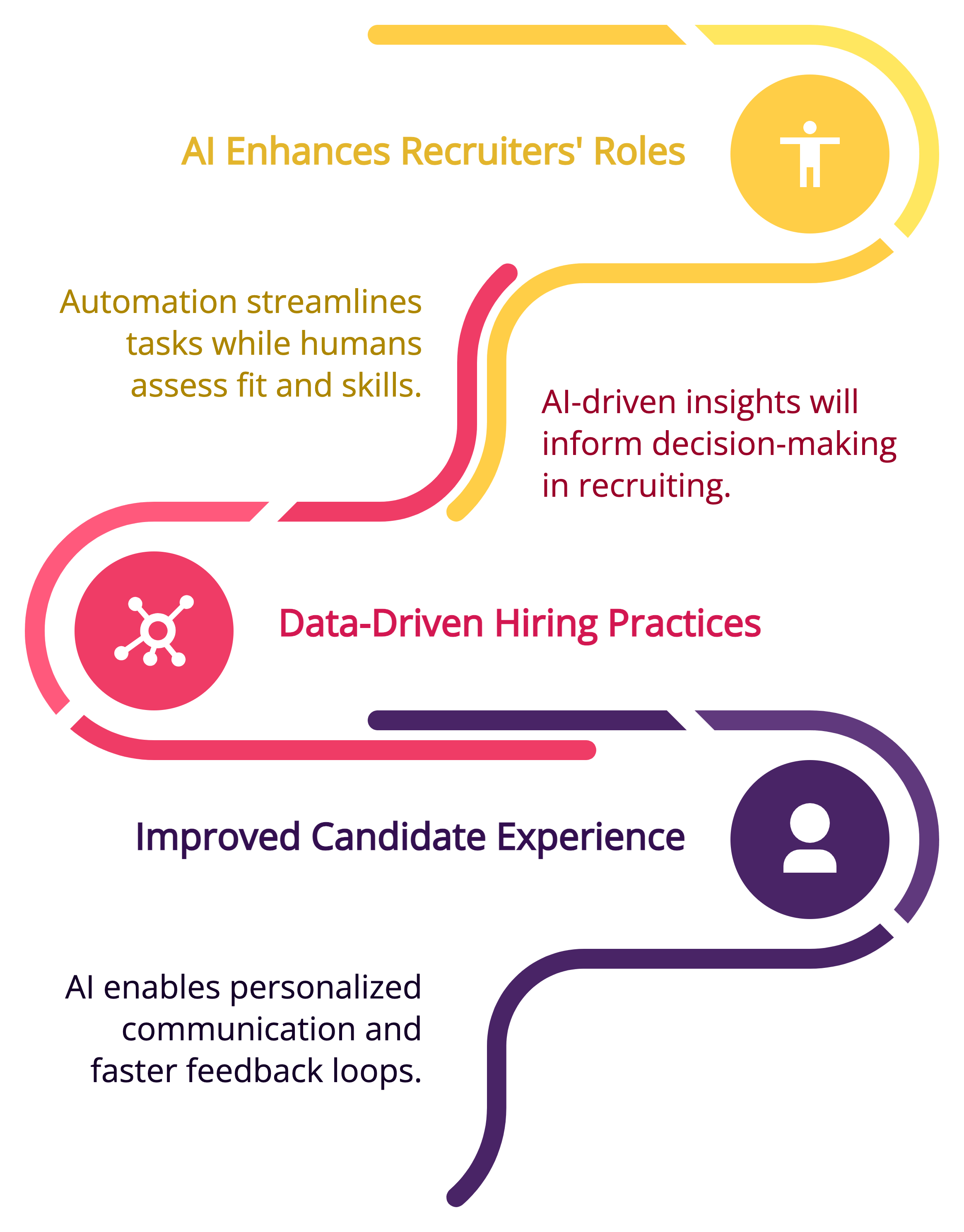
1. AI Will Enhance, Not Replace, Human Recruiters
AI automates time-consuming tasks like résumé screening, scheduling, and initial candidate communication. However, human recruiters remain essential for assessing soft skills, cultural fit, and final hiring decisions. AI makes the process more efficient, allowing recruiters to focus on high-value tasks like relationship-building and strategic planning.
2. Hiring Will Become More Data-Driven
AI will continue to improve its ability to analyze hiring trends and predict job performance. With machine learning, AI can evaluate large datasets to identify candidates who are not only qualified but also likely to stay with a company long-term. This helps businesses reduce turnover and make more informed hiring decisions.
3. AI Will Improve Diversity and Inclusion
AI hiring tools can reduce unconscious bias by evaluating candidates based on skills, experience, and qualifications rather than personal characteristics. Many companies are already using AI to promote fairer hiring practices by eliminating biased language from job descriptions and using objective candidate assessments.
4. AI-Powered Employee Retention Strategies
AI won’t just help businesses hire the right people it will also help them keep employees longer. Future AI tools will monitor employee engagement, analyze workplace satisfaction, and recommend retention strategies. This will be especially valuable for high-turnover industries looking to create a more stable workforce.
Should You Use AI for Hiring?
If your company struggles with slow hiring, high turnover, or inefficient recruitment processes, AI can provide a solution. AI-powered hiring tools streamline recruitment, identify top candidates faster, and improve overall hiring success.
How to Get Started with AI in Hiring
- Identify pain points – Are you overwhelmed with applications? Losing good candidates to slow hiring? AI can help.
- Choose the right tools – Look for AI-driven applicant tracking systems, chatbots, and predictive analytics solutions.
- Test and optimize – Start with one AI tool and track its impact before expanding to more AI-driven solutions.
- Keep the human touch – Use AI to enhance, not replace, human decision-making in hiring.
AI is the future of hiring, but it works best when combined with human expertise. Companies that embrace AI now will gain a competitive edge, reduce hiring costs, and build stronger teams. If you want to improve your hiring process, it’s time to explore AI-driven recruitment tools.
Allow us to introduce you to Edward, a distinguished figure in the realm of autonomous AI, serving as the Chief Data Scientist of a prominent organization. Edward’s journey into the fascinating world of data science was forged through the crucible of rigorous education at the prestigious Caltech. With a deep-rooted passion for unlocking the secrets of data, he has seamlessly blended his academic prowess with real-world innovation, shaping the future of autonomous AI.
Beyond the world of algorithms and data sets, Edward finds balance in his life in the bustling city of Los Angeles, where he resides with his loving wife and three cherished daughters. Despite the demands of his groundbreaking work, he cherishes the simple joys of family and frequently embarks on leisurely walks, not only as a form of relaxation but also as a source of inspiration. Join us on a journey through Edward’s world, where the intricate dance of data science and the warmth of family life intertwine, offering a unique perspective on the evolving landscape of autonomous AI.

